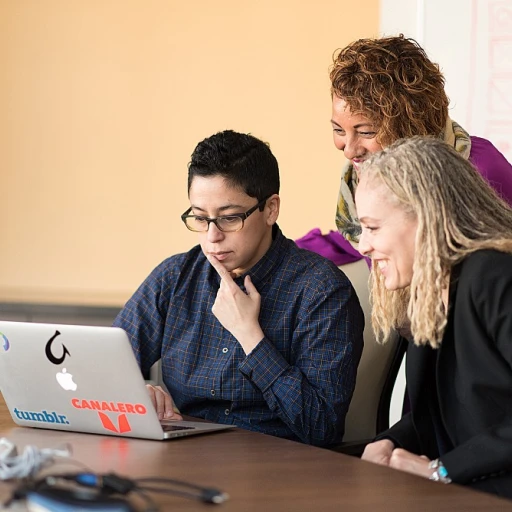Understanding the Core Principles of the 'Seven Habits'
Exploring the Foundation of Effective Habits
The concept of the 'Seven Habits' as outlined in Stephen Covey's influential book is a cornerstone for individuals seeking personal and professional growth. This document serves as a comprehensive overview of how these habits can be applied in the context of professional mentoring. Understanding these core principles is essential for both mentors and mentees aiming to enhance their personal effectiveness.
At the heart of Covey's book is the idea of becoming highly effective by adopting specific habits. These habits are not just actions but mindsets that encourage proactive behavior, personal management, and an overall win-win approach to life. The seven habits emphasize the importance of being proactive, which is a crucial trait for mentors guiding their mentees towards success. By embracing these principles, individuals can cultivate a proactive habit mindset that significantly impacts their professional and personal lives.
Understanding the Document's Core Principles
The 'Seven Habits' PDF is more than just a document; it is a guide to transforming one's approach to personal and professional challenges. Covey's habits encourage people to seek first to understand, then to be understood, fostering a deeper connection and effective communication between mentors and mentees. This approach not only builds trust but also lays the groundwork for a mentoring relationship that thrives on mutual respect and understanding.
For those new to the concept, the Covey habits focus on developing a proactive habit mindset, which is essential for effective people management. By integrating these habits into daily life, mentors can help their mentees set and achieve personal and professional goals, creating a synergistic relationship that benefits both parties. To delve deeper into how these principles can be integrated into a leadership system, consider exploring building an integrated leadership system in professional mentoring.
Building Trust and Effective Communication
Fostering a Foundation of Trust
Establishing trust is a cornerstone of any successful mentorship. Stephen Covey's "Seven Habits" book emphasizes the need for trust as a key ingredient in effective personal and professional relationships. Trust acts as the binding agent that holds the mentor-mentee relationship together, creating a space where individuals feel safe to share, learn, and grow. When mentors and mentees understand this critical element, they can create a culture of open dialogue and transparency, paving the way for deeper connection and mutual respect. As Covey suggests, when people feel trusted, they are more likely to engage deeply and contribute proactively.Cultivating Effective Communication
The "Seven Habits" document highlights the significance of seeking to understand before being understood. This principle plays a crucial role in mentoring, where effective communication is the backbone of interaction. People learn to listen empathetically, not just waiting for their turn to speak. By honing their listening skills, mentors and mentees can better understand each other's perspectives, needs, and challenges. This approach nurtures a productive environment where ideas are freely exchanged, enhancing personal effectiveness and fostering a win-win mindset. To help mentors and mentees develop these communication skills, enhancing skills through mentor training programs can be incredibly beneficial. Training programs can equip individuals with the tools and techniques necessary to navigate complex interpersonal dynamics within their mentoring relationships.Evolving in Effective Communication
Stephen Covey notes that effective people are proactive initiators of conversations, aiming to achieve understanding. Taking responsibility for leading dialogues can elevate mentorship to new heights. By instilling this habit of proactive communication, individuals involved in mentoring can drive their professional relationships forward and solve problems collaboratively. Encouraging a personal investment in communication can further amplify the effectiveness of mentoring. As mentees and mentors engage with new habits highly emphasized in Covey's work, they not only enhance the current mentoring relationship but also improve their life communication strategies.Goal Setting and Personal Development
Strategizing Personal Development Goals
To achieve professional mentoring success, understanding the importance of goal setting and personal development is a critical aspect. One of the key insights from the 'Seven Habits' is the emphasis on creating clear, meaningful objectives that guide individuals towards personal effectiveness. This principle, articulated in the covey book, encourages mentors and mentees to define what truly matters in their personal and professional lives.- Goal Clarity: Recognizing and articulating what you want to achieve is essential. The habit of envisioning the end goal ('Begin with the End in Mind') is fundamental. It helps people focus on the outcomes that align with their values and priorities.
- Action Planning: Having a clear plan that outlines steps to reach these goals makes the path to success more tangible and manageable. This planning incorporates proactive habits, ensuring that daily actions contribute to long-term vision and effectiveness.
- Prioritization: Borrowing from the 'Put First Things First' habit, prioritizing tasks based on their importance, not urgency, is key. This aspect of time management helps manage personal energies and resources effectively, focusing on highly impactful tasks.
- Regular Review: Continuous assessment and adjustment of goals as circumstances change is also vital. Individuals need to evaluate progress, ensuring that the goals remain relevant and achievable.
Encouraging Proactivity and Responsibility
Encouraging Personal Accountability and Ownership in Mentoring
Promoting proactivity and responsibility is integral in fostering an effective professional mentoring relationship. Understanding how to encourage these qualities in both mentors and mentees can significantly enhance the mentoring process. The significance of being proactive, as emphasized by the concepts found in influential works like the Seven Habits of Highly Effective People, can lead to greater personal effectiveness by instilling a habit of ownership over one's actions and decisions. Effective mentorship aims to build individuals who take initiative and are accountable for their personal and professional growth. Here, the emphasis is on developing a proactive habit that empowers mentees to steer their journey toward success. This involves nurturing a mindset that prioritizes taking control of what one can influence, reinforcing Stephen Covey's focus on habit formation that highlights proactive behaviors.- Encouraging Initiative: Mentees should be supported to initiate conversations, seek feedback, and explore opportunities without waiting for external prompts. This active engagement is pivotal in transforming them into highly effective individuals.
- Fostering Responsibility: Mentors and mentees alike should embrace the habit of taking responsibility for their actions and outcomes. Covey's book underscores the significance of not allowing external circumstances to dictate one's effectiveness.
- Developing Forward-Thinking Attitudes: It's crucial to cultivate a habit mind that anticipates challenges and prepares for them. This involves understanding that the management of one's habits and outlook can directly influence their success trajectory.
- Utilizing the Document's Insights: The principles outlined in the highly-regarded document provide a framework for converting reactive tendencies into proactive strategies, essential for personal and professional evolution.
Creating a Synergistic Mentoring Relationship
Fostering Collaborations with a Shared Purpose
In professional mentoring, creating a synergistic relationship is pivotal for the mutual growth of both mentor and mentee. Building on the principles discussed earlier, this section delves into the integration of people's habits and shared goals to nurture a cohesive mentoring environment.
The 'Seven Habits,' as outlined in the renowned Covey book, emphasize the importance of synergy as a key habit. By embracing this habit, individuals can transcend personal limitations and achieve collective success. The essence lies in understanding that when effective collaboration comes into play, the combined effect is more than the sum of individual capabilities.
Understanding and Being Understood
A foundational element in this process is the habit of seeking to understand before being understood. This principle, articulated powerfully in the seven habits document, advocates for genuine empathy. When mentors and mentees practice this, it paves the way for transparent, candid dialogues. Both parties benefit from improved personal effectiveness, driving forward the mentoring relationship.
As they work through their mentoring sessions, it’s imperative for mentors to encourage a proactive habit among their mentees. By taking responsibility and initiative, mentees can bring fresh perspectives and solutions to the table. It strengthens their ability to manage things independently while enhancing their competency.
Building a Win-Win Attitude
Central to the development of a synergistic partnership is cultivating a win-win mentality. The notion of 'win' as cited in the covey habits doctrine, urges individuals to negotiate for solutions that are mutually beneficial. Through effective communication and an open mindset, mentors can aid their mentees in achieving balance and fostering cooperation.
In essence, the culmination of these efforts revolves around the altruistic goal of enhancing personal effectiveness not just for one's life but for empowering others as well. By embodying these highly effective habits within the mentoring framework, parties involved can facilitate a nurturing environment conducive to ongoing growth.












